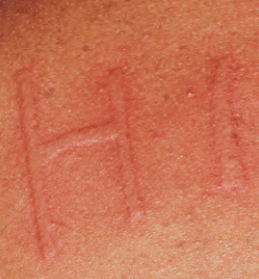Dermographism is the most common subtype of chronic inducible urticaria. It can be classified into:
- Simple type which presents with a symptomatic wheals.
- Symptomatic type which presents as pruritic wheals.

Medical treatment options
General tips
- Avoid of triggering factors and physical stimuli.
- Only symptomatic cases should be treated.
Simple Dermographism
- No treatment is needed because it is not itchy.
- Emollients may be used if the patient has dry skin
Symptomatic Dermographism treatment options
- Second generation H1 antihistamines
- Cetirizine: adult dose 10 mg/day.
- levocetirizine: 5 mg once daily.
- Loratadine: adult dose 10 mg daily.
- Desloratadine: adult dose 5 mg daily.
- Rupatadine: adult dose 10 mg daily.
- Fexofenadine (adult dose 180 mg/day).
- First generation H1 antihistamines
- Chlopheniramine: 4 mg three times per day( up to 12 mg at night).
- Hydroxyzine: 10-25 mg three times daily( up to 75 mg at night).
- Diphenhydramine: 10-25 mg at night.
- H2 antihistamines (add on therapy if not controlled on H1 antihistamines)
- Ranitidine : adult dose 150 mg twice a day.
- Famotidine: 20 mg twice daily.
- Cimetidine: 400 mg twice per day.
- Omalizumab
Physical treatment options
- Light therapy
- Relapse may happen within 2 to 3 months after treatment stoppage.
Read more : Review about Dermographism